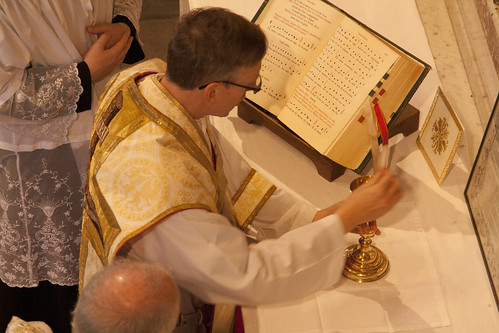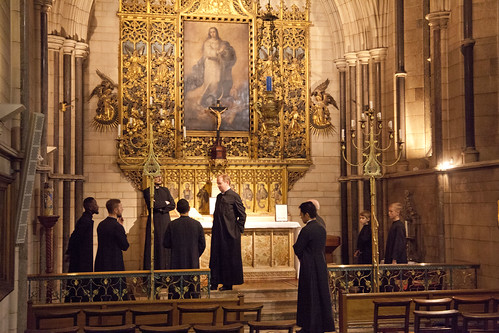Chairman's Blog
The liturgical reform and 'the missions'
SIR – It was with great joy and interest that I read Daniel Dolley’s article on “how to evangelise the Amazon” (Cover story, January 24).
Dr Dolley’s point that the Amazon communities are more traditional in their approach to gender roles, religion and ritual action than those who advocate on their behalf is also valid for the Karen communities in northern Thailand, where I did my own ethnographic fieldwork for my DPhil in International Development.
I lived for a total of 12 months in a Catholic Karen village in Chiang Mai province. An elderly French missionary priest was responsible for the village church and the community appreciated his liturgical correctness. There were daily Masses and morning prayer and weekly rosaries and Stations of the Cross during Lent. The women in the village formed a Legio Mariae group and most households had holy water at home.
The village elders started to become Catholics in the 1950s and spiritual protection was – just like for the Amazon people – a major reason for conversion.
During my stay, villagers told me several times that they preferred priests who wore proper vestments, including an alb, to those who just use a stole for celebrating Mass. A good liturgy and the correct vestments gave the religious service the dignity that the Karen expected from sacred rites. Indeed, like the Amazon people Dr Dolley wrote about, the Karen people in Thailand did not find it difficult to engage with the traditional rituals of the Church.
Perceiving this parallel between the Amazon people and the Karen of northern Thailand highlights to me the global dimension of the issue at stake, ie how the Church can best serve indigenous peoples around the world.
The usefulness of Latin
 |
| Mass during the LMS Priest-training Conference in Prior Park. |
Reply to Prof Healy in Homiletic and Pastoral Review
 |
| Low Mass in the Slipper Chapel at Walsingham, England |
Professor Mary Healy, a member of the Pontifical Biblical Commission, recently wrote a piece for the Homiletic and Pastoral Review on the 50th Anniversary of the Novus Ordo Missae: the 'Ordinary Form'. She wrote:
It has become common to blame today’s lack of Eucharistic faith and fervor on the revised rite. Critics rightly point to certain weaknesses such as collects that are less expressive of God’s majesty, and the omission of important biblical texts from the lectionary. Another unfortunate change is the elimination of the Octave of Pentecost, giving the impression of downgrading the great solemnity that culminates the Easter season. The primary problem, however, is not the reformed rite itself but its flawed implementation, due to poor — and, in some cases, catastrophically defective — theological and spiritual preparation among clergy and laity alike. Too often, the liturgical changes were accompanied by a downplaying of the notion of sacredness. A casual attitude toward the liturgy was fostered, and beautiful churches were “wreckovated.” Lukewarm liturgy has, tragically, obscured the authentic renewal called for by the Council itself.
I found this very encouraging, in the sense that it represents a big advance on the anti-Old Mass polemic one might have expected in a mainstream organ like the Homiletic and Pastoral Review. Official and establishment publications would until recently have thought unstinting praise for the reform would be compulsory, with just a nod towards the problem of liturgical abuses. Prof Healy agrees that criticisms of core aspects of the reform such as the collects are actually justified, and though this is not made explicit, the implication is that she also accepts that the liturgical reform has played a role in 'today's lack of Eucharistic faith and fervor', even if the 'primary' driver is the issue of implementation and abuses.
It is admittedly difficult to quantify the effect of different factors, but it seems to me that this is a defensible claim: that the abuses/ 'implementation' issues of ad-libbing, invalid matter, female altar servers, communion in the hand, the complete elimination of Latin and traditional sacred music, terrible English translations, and the wrecking of churches to make 'versus populum' celebration possible, had at least slightly more negative effect on the eucharistic faith of the people than the changes to the collects, lectionary, signs of reverence, and the loss of so many beautiful and expressive ceremonies.
Even if we disagree, this is a pretty interesting discussion to be having 50 years after Pope Paul VI promulgated the reformed missal. We have truly come a long way.
Healy goes on, nevertheless, to assert the superiority of the Ordinary Form in a number of respects, and I have responded to her points in a piece now also published in the Homelitic and Pastoral Review. I am delighted that they given house-room to a debate such as this, and I hope readers find it interesting.
You can read my article here.
Support the Latin Mass Society
The peoples of the Amazon need Christ
My latest on LifeSite, inspired by the cover article in the Catholic Herald by Dr Daniel Dolley the other week.
----------------------
The ancient Greek historian Herodotus records a story about a young man who caused the accidental death of his brother. Fleeing from home, he was taken in by a king who performed the necessary rite of purification and took him into his own household. One day, out hunting with the king’s son, the young man accidentally caused the prince’s death. In despair, he took his own life.
What is the moral of this story? The king’s act of kindness was misjudged; the rite of purification was not sufficiently powerful; those whom the gods have chosen to afflict cannot be helped. Perhaps the young man had inadvertently offended some deity, a common occurrence in Greek myth. You can’t be too careful: Works and Days by Hesiod attempts to summarize omens and auspicious and inauspicious days for everything from getting married to planting beans. The result is a mind-boggling collection of material that, if taken seriously, would control one’s every action, with no guarantee of success. This is what life under paganism was like in ancient Europe, and it was to this world that the Church’s sacraments and spirituality were first directed.
Support the Latin Mass Society
Talk on consent and sex eduction
A talk from last December.
The vocation to have children
My latest on LifeSite.
Engaging with post-Brexit politics
I've written for LifeSite about the possibilities for Catholics to engage with the new generation of politicians who have emerged from Brexit: despite their greater distance from the practice of Christianity than their predecessors.
It begins:
There is a theory going around that Britain’s prime minister, Boris Johnson, is going to grasp a historic opportunity to realign his Conservative Party in relation to emerging voting patterns. It goes like this. Johnson’s predecessor-but-one, David Cameron, combined austerity and globalisation with social liberalism, notably by forcing “same-sex marriage” through Parliament, against great opposition from inside his own party. This did much to neutralise the opposition of the liberal media and arts establishment.
But things have moved on. The hyper-liberalism of the political left has cut them adrift from their traditional working-class supporters, who value family and country. Public finances don’t look quite as bad as before. The vote to leave the European Union and the ferocious opposition to this by the political and media establishment has crystalized the break between the left and its traditional base. Johnson’s strategy will be to pivot the Conservative Party into a more socially conservative, but less capitalist-friendly, party, to scoop up these newly available votes.
Serving and Sewing for the Kingdom of God
What can we do to advance God's reign on earth? What does it mean, today, to work in the Vineyard? If you are in despair about state of the Church and the state of society, what can you actually do about it?
It is far from the case that you can't do anything. The work of resistance to the chaos and of restoration is going on all around you. Here are two examples taking place in London: training on how to serve the Traditional Mass by highly experienced Masters of Ceremonies, and the mending of old vestments under expert guidance. Stop complaining, and come along! You don't need any qualifications, and there is no fee to pay.
Photos from last Saturday. The next dates are
March 14th (booking page for the serving), and May 9th (booking page for the serving). More info.
CMA Youth Retreat, 8th Feb, Haverstock Hill, London
Are Western Christians persecuted?
My latest on LifeSite.



